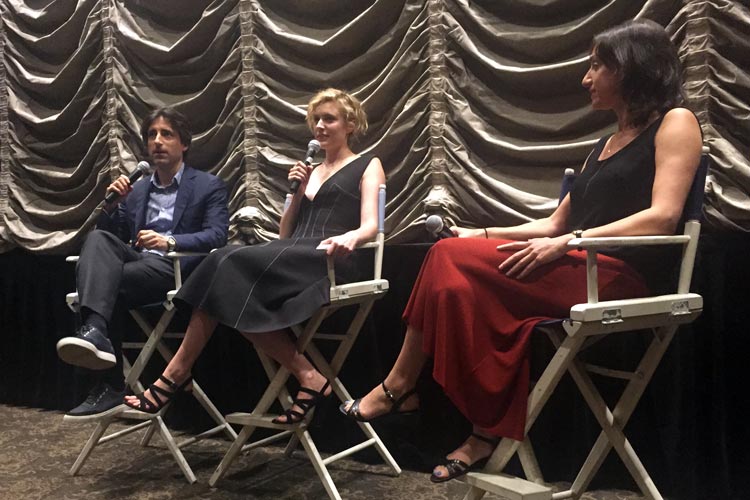The following questions and answers are excerpted from a conversation that followed the NBR screening of Mistress America.
How did you develop the wonderful physicality of Greta’s character Brooke? She emotes with her entire body.
Noah Baumbach: Well first, Greta was born. And grew up into that person.
Greta Gerwig: Not Brooke!
Baumbach: No, not Brooke, but you’re expressive.
Gerwig: Yeah, I’m expressive. I like big characters. I always feel a little put in a box when something is shot very close and it’s all face acting. That’s hard for me. I feel as if I have a clown face, in that it’s too big and makes too many expressions. I think the ideal of film acting is like . . . a flicker of emotion across the eyes, and I’m not like that! I feel like I need a medium shot all the time. I’m lucky that Noah likes to shoot that way. With Brooke, she sort of invokes another time. She doesn’t really dress like people who are on the move, wanting to start a restaurant right now. It’s more like an early 90s look, with all those blouses and trousers and coats, and the way she does her makeup and hair. It doesn’t feel like now. There was a particular walk she had in those boots with the heels, and we would talk about people we knew who influenced Brooke. Noah referenced someone he knew who used to stomp around in her heels. That’s something I thought about when I was doing Brooke. Frances [in Francis Ha] was so stumbly and down and inward. But Brooke is so straight on, ready to go, impossible to embarrass: striding and stomping ahead. I don’t know why those things matter so much to me in a performance, but if I don’t know what someone’s feet are doing, I almost can’t say the lines.
“If I don’t know what someone’s feet are doing, I almost can’t say the lines.”
What made you choose this particular house for the central set piece in Connecticut?
Baumbach: We looked at a lot of houses and wanted something surprising and unexpected in some ways. I liked how this house had all these exposed stairs where you could see people running up and down and in and out. Greta described it as a slamming door comedy with sliding doors. There are a lot of people trying to get doors open with two hands. I also liked how you could use inside and out because there were so many windows. It was kind of a pain to shoot because the weather kept changing – we were in the winter and it kept snowing – and it was hard to avoid any windows. But it was worth it because of the idea that they’re trapped in there but the outside world is always in view.
Gerwig: And as someone pointed out in an interview with me, we put them in a glass house and all the characters do is throw stones at each other! I was like, wow, we never talked about that. I’m glad we didn’t notice. Noah probably would have been like, we’re changing the house!
Do you usually try to develop characters or story first?
Gerwig: Characters and story come at the same time. It’s impossible to flush out a character and story independent of each other. You sort of find out who they are by what they do, and you find out what they do by who they are. It all grows at the same time.
The central relationship between Brooke and Tracy is so fascinating because there’s clearly affection, but they’re both trying to benefit from it at the same time.
Baumbach: One of the things we discussed about Brooke in the early stages of the script was that she felt like somebody you might meet at an important time in your life, but for a very brief time. I think it’s this thing that happens to you in your young adulthood where you realize you can outgrow people who are older than you. When you’re younger, you don’t think that’s possible because you think of adults and you think of children. That was something we were interested in telling. The Brooke/Tracy relationship had a melancholy baked into it because it was temporal. There is genuine love between these two people, and even though Brooke experiences Tracy’s story as a kind of betrayal, it’s ultimately freeing for her because Tracy loves her and she sees her, through her persona. Brooke needs that in a way because she can’t sustain this thing she’s doing. She’s actually very lucky that Tracy does that. You can argue it’s selfish of Tracy to have done it, which might be true, but it doesn’t mean both can’t be true. We like that these two people could have an argument where they both have points, and neither ever cedes their ground. But they could still come to some kind of peace and still have genuine affection for each other while disagreeing about what happened.
Gerwig: Brooke has her light show, and Tracy sees past it, but Brooke actually is inspirational. Despite the fact that the show’s fake, there is something real and very inspirational underneath it. Being seen is traumatic, but it’s also healing.

